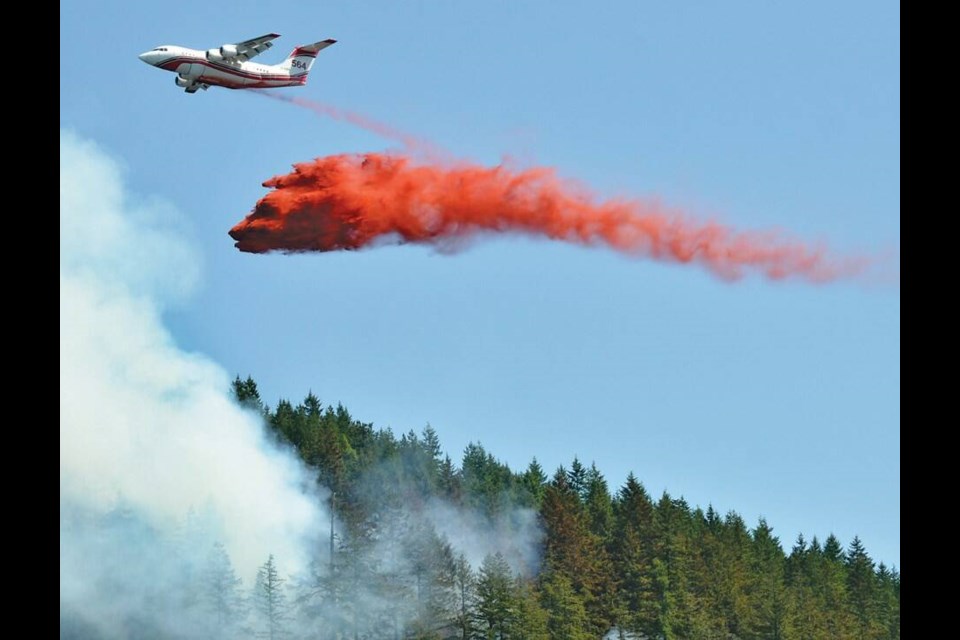Each summer wildfires are becoming more frequent and more destructive, causing response teams across the country to ramp up their preparedness efforts. As we roll into another likely record summer, local fire services are preparing to do the same – but they’re not feeling too hot under the collar just yet, they assure.
“We’re all very aware that we’re forecasted to have a really hot, dry summer,” said recently appointed District of North Vancouver Fire and Rescue Services chief Mike Danks. “Due to climate change we’re seeing significant changes in weather with drier, hotter conditions, which is always concerning, but we do a ton of preparation with our equipment and our staff to ensure that everyone always has a very high level of training to respond to those incidents.”
North Shore fire departments have been particularly adept at responding to wildfires, with the few that have occurred in North and West Vancouver being mitigated “very quickly,” said Danks.
“I really think that’s due to the preparedness of crews to respond to incidents of that nature, and our very engaged community that is always on high alert for those.”
In April, both West Vancouver Fire & Rescue and the District of North Vancouver Fire & Rescue Services took part in a multi-agency exercise designed to prepare both teams for a potentially record-breaking fire season.
Dubbed Operation Jubilee, the event simulated a forest fire breakout at the boat-access-only Camp Jubilee. Emergency crews and supplies were deployed as the two fire teams collaborated with North Shore Emergency Management, Royal Canadian Marine Search and Rescue, BC Wildfire Service and Metro Vancouver Watershed Protection for a swift and efficient clean up.
“For all the agencies to get together and to exercise going through the process of responding to an incident like that, it makes it muscle memory to understand how crews are going to be deployed, how the equipment will be packaged,” said Danks.
“The community can then see what that response looks like, and can understand why we make the decisions we do under those circumstances.”
Jeremy Duncan, Deputy Fire Chief at the District of West Vancouver, said response teams are well prepared across the North Shore – “there has been years of work from all three departments to be ready, prepared, trained and to get the right equipment” – but the preparedness is less effective if the local community doesn’t collaborate.
Much of the onus in preventing such fires is on the public, he said.
“Weather is causing the risk factor of the burn, but it’s not starting the fire. We don’t have a lot of lighting in the coastal regions. If a wildfire starts, it’s usually human caused,” said Duncan. “If everybody just increases their awareness and realizes that the new normal must be making safer choices, especially around the likes of development and landscaping, then that will make a huge difference. We all play a part.”
Both District of North Vancouver and West Vancouver offers free wildfire home hazard assessments, where a wildfire mitigation specialist will inspect a home to determine how fire smart it is, before providing recommendations on what can be done to reduce the chance of it being affected by an external blaze.
There are also small precautions a homeowner can take to increase a property’s chance of survival, said Danks, from opting for a non combustible roof to managing the vegetation that surrounds the property. Clearing shrubbery in a 10-metre radius can increase the home’s chance of survival by 90 per cent.
There are the lapses in common sense that are equally as detrimental, like not discarding cigarette butts safely, using machinery in dry forested areas, or leaving campfires unattended. Wider education around the risks of such everyday activities is paramount, said Duncan.
“The fire department can do their best to be prepared to respond to these incidents, and we offer services to ensure that we’re working with our community to reduce the chance of wildfire, but the onus is also on the residents in the community to ensure that we’re working together to reduce the risks,” he said.
“The community is also our eyes and ears, so if you do see a wildfire, please make sure that you notify emergency services as quickly as possible.”
Mina Kerr-Lazenby is the North Shore News’ Indigenous and civic affairs reporter. This reporting beat is made possible by the Local Journalism Initiative.



